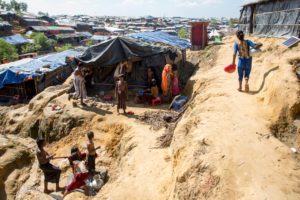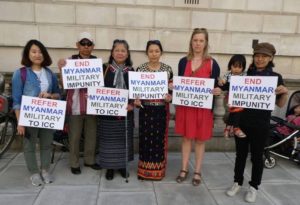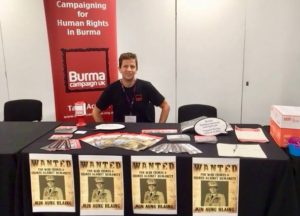Protests at Burmese government’s plan to close IDP camps – VOA News
“I am worried about you”, Burma Campaign UK’s Campaigns Manager Zoya Phan told VOA Burmese News after the Burmese government announced plans to close camps for IDPs (internally displaced persons) in ethnic areas.
A statement by the Ei Tu Hta IDP Supporting Committee of ethnic organisations calls on the Burmese government to immediately halt all plans involving closure of IDP camps in ethnic areas and address the root causes of the decades-long civil war before discussion of IDP return.
EU imposes sanctions on Myanmar officers over Rohingya offensive – Financial Times
The EU has imposed sanctions on seven regional Myanmar military and police officers over alleged atrocities against Muslim Rohingya — but stopped short of targeting top national commanders including the head of the military, Min Aung Hlaing.
Mark Farmaner, director of Burma Campaign UK, told the FT: “In effect, the entire EU response to what is probably genocide of the Rohingya is to stop seven soldiers and police officers shopping in the EU. It is hard to see how EU officials can truly believe this is an adequate response to what has taken place.”
Read Financial Times article (behind paywall)
Burma Campaign UK meets Shadow Justice Minister Imran Hussain
Burma Campaign UK’s Director Mark Farmaner and Campaigns Officer Karin Valtersson today met Imran Hussain MP, Shadow Justice Minister for the Labour Party, to discuss the human rights situation in Burma and the need for accountability.

Burma Campaign UK at UNISON conference
Rumours swirl of MyTel’s Buddhist extremist links – Coconuts Yangon
Coconuts Yangon reports on rumours that the recently launched telecoms operator MyTel has subtly endorsed the nationalist 969 Movement, an Islamophobic group whose stated goals include preventing Muslim population growth in Myanmar.
Mark Farmaner, Burma Campaign UK’s Drector, tweeted: “MyTel is the most expensive mobile network in Burma. It funds the military, costing lives of ethnic people every day. Taking funds from health and education to buy guns and jets. Blocking democratic constitutional reform. #boycottMyTel”
Questions hang over the UN’s secret Rohingya deal with the government of Burma
By Mark Farmaner, Director, Burma Campaign UK
Serious questions and doubts hang over the new MOU signed between the United Nations and the government of Burma on a supposed framework for creating conditions for safe return for Rohingya refugees.

For a start, to date, it’s a secret deal. It’s about the Rohingya but the Rohingya are not allowed to see it, let alone have an input into what it contained.
It allows the UN some access in Rakhine State but it is not clear how much. Will the UN have unrestricted access at last, or have they compromised? Even before the latest Rohingya crisis began in August last year, restrictions on humanitarian aid in Rakhine state were unacceptable and costing lives. Does this deal even take us back to that previous unacceptable situation?
The government of Burma should not be praised for merely returning access to the same, or less than, the situation prior to August 2017. The two steps back one step forward and then receive praise for the one step despite things being worse was a game successfully played over and over again by the previous military regime. It’s time to stop falling for it.
The UN says the agreement will allow it to provide independent information to Rohingya refugees about the conditions in their place of origin so that they can make informed decisions about return. (Link: http://www.unhcr.org/news/press/2018/5/5b0fff7b4/unhcr-undp-agree-text-mou-myanmar-support-creation-conditions-return-rohingya.html) With the increased militarisation of Rakhine State, the situation can change very rapidly with soldiers being able to move into Rohingya villages even more quickly than before. The local and national situation can change very rapidly. While information about what happened to their homes and villages is obviously important, it’s the general political and security situation which is most important in allowing Rohingya to assess conditions for safe return.
The UN stated that the agreement “will affirm the Myanmar Government’s commitment to work with UNHCR and UNDP to find a solution for the Rohingya population, in line with the recommendations of the Advisory Commission on Rakhine State. The recommendations include establishing a clear and voluntary pathway to citizenship and ensuring freedom of movement for all people in Rakhine State, irrespective of religion, ethnicity or citizenship status.” (http://www.unhcr.org/news/press/2018/5/5b0fff7b4/unhcr-undp-agree-text-mou-myanmar-support-creation-conditions-return-rohingya.html)
There are several concerns regarding this. The Burmese government accepted the recommendations of the Advisory Commission on Rakhine State ten months ago, yet there is little tangible evidence of any serious attempts to implement those recommendations since then, and there is no transparency in the process. There has been no movement at all on citizenship. Bill Richardson, who resigned from the Advisory Committee on the implementations of Rakhine Commission recommendations, described it as a whitewash. (https://uk.reuters.com/article/uk-myanmar-rohingya-richardson-exclusive/exclusive-richardson-quits-myanmars-whitewash-rohingya-crisis-panel-idUKKBN1FD2OF)
The Advisory Commission recommendations on citizenship were a compromise and didn’t go as far as they should have.
The Commission recommends the Myanmar government implement the current 1982 Citizenship Law. This is despite the Commission itself stating: ‘Several aspects of the 1982 Citizenship Law are not in compliance with international standards and norms – such as the principle of non-discrimination under international law – as well as international treaties signed by Myanmar. Most notably, the Convention on the Rights of the Child (CRC).’ http://www.rakhinecommission.org/the-final-report/ ) The Rakhine Commission, is therefore, urging the government of Myanmar to more fully implement a law that violates international law.
The Rakhine Commission recommendation of an ‘acceleration of the citizenship verification process… under the 1982 Citizenship Law’ is unacceptable to most Rohingya and is no guarantee that citizenship will follow. It is a completely unnecessary step.
Given the track record of the Burmese government in delay and deceit, the Rakhine Commission recommendations on reform or repeal of the 1982 Citizenship Law are far too vague and weak when it comes to implementation.
It states: ‘..the Commission recommends the Government set in motion a process to review the law. As part of such a review, the Government might wish to consider the following: …Within a reasonable timeline, the Government should present a plan for the start of the process to review the Citizenship Law.’ They suggest the government ‘might wish’ to consider recommendations regarding changing the law which should be considered essential.
Given these concerns, the return of the use of language about ‘pathways’ to citizenship is especially worrying. This was compromise language that started to be more widely used by the international community after violence against the Rohingya in 2012, in the face of bullying by Thein Sein’s government, which dramatically escalated its demands that diplomats not use the word Rohingya. (http://www.unhcr.org/news/press/2018/5/5b0fff7b4/unhcr-undp-agree-text-mou-myanmar-support-creation-conditions-return-rohingya.html)
Backing down to these demands was one of the first of many compromises made over the rights of the Rohingya which encouraged the Government to believe, so far correctly, that they could get away with what they have now done to the Rohingya. Until 2012, the EU, USA, UK and others had been unequivocal about the need to reform or repeal the 1982 Citizenship Law. Agreeing to ‘pathway’ language was an ethical and tactical mistake which appears to be being repeated. The United Nations and the rest of the international community should be unequivocal about the need for immediate full citizenship for the Rohingya. This should be a minimum condition.
The agreement does not include the military. Of course, in general, agreements like this are made with governments, but not including the military ignores the reality on the ground. The government does not control the military. It cannot guarantee safety as the military can independently decide to launch another offensive against the Rohingya at any time. The military have made no commitment not to repeat what they have just done.
Also needing clarification is the claim that the UNHCR will be able to carry out protection activities. (http://www.unhcr.org/news/press/2018/5/5b0fff7b4/unhcr-undp-agree-text-mou-myanmar-support-creation-conditions-return-rohingya.html) When tensions rise ahead of violence, the UN pulls staff out of areas where Rohingya live, or they are likely to be expelled in advance of any new military offensive. Given this, is there a danger that the UNHCR is giving Rohingya the impression the UN will protect them if they return, when in fact they are powerless to do so? What can UNHCR staff on the ground really do to protect villagers if the military arrive?
Comments by the UN Resident and Humanitarian Coordinator, Knut Osby, about Rohingya “needing an identity” are also worrying and perhaps an indication of how much the UN is compromising and pandering towards the agenda of the government. (https://twitter.com/knutostby/status/1004669681045667840)
The Rohingya already have an identity. The problem is not that they need an identity, it is that the government of Burma is trying to deny that identity. The United Nations should be unequivocal in defending their right to their identity.
The UN Co-ordinator also conspicuously tried to avoid using the name Rohingya when talking about the agreement about the Rohingya, and the two paragraph UN statement on the agreement about the Rohingya also avoided using their name. (http://www.undp.org/content/undp/en/home/news-centre/news/2018/UNDP-UNHCR-MOU-Myanmar.html) Not using the word Rohingya is not a neutral decision. It is backing down to the demands of racists who want to expel all Rohingya from Burma.
Any discussion about so-called safe, voluntary and dignified return cannot take place without taking into account the failure of the international community to provide adequate support to refugees who have fled to Bangladesh. As of 8th June 2018, the United Nations budget for supporting refugees and host communities was only 21 percent funded. Conditions in the camp are harsh, and the upcoming monsoon season will make things much worse. https://www.parliament.uk/business/committees/committees-a-z/commons-select/international-development-committee/news-parliament-2017/bangladesh-and-burma-publication-17-19/
Rohingya living in camps in Bangladesh have not been demanding, safe, voluntary and dignified return, whatever that means. When the UN Security Council delegation visited the camps, their demands were clear. They called for immediate full citizenship as a condition for safe return. They called for justice and accountability, knowing that impunity encourages further violence against them.
While a renewed emphasis from the UN on citizenship is welcome, this agreement appears to have backed down to the Burmese government agenda of so-called pathways to citizenship. All evidence points to this being a delaying tactic, used by both Thein Sein’s government and Aung San Suu Kyi’s government. With her majority in Parliament, Aung San Suu Kyi can pass a new citizenship law in line with international law and standards giving all Rohingya citizenship, any time she chooses. But the longer there is delay, the harder it will become.
Immediate movement on reforming or repealing citizenship must be an essential precondition for safe return.
Ensuring justice and accountability is also essential. No-one can seriously believe the government will conduct a credible investigation into what has happened. Every investigation has been a whitewash. Aung San Suu Kyi still has the notorious fake rape poster on her website: http://www.statecounsellor.gov.mm/en/node/551#
Min Aung Hlaing and his military have paid no price for what they have done. Support for an ICC referral and the prospect of justice and accountability would be one of the most effective ways to start a process of ensuring safe return. As long as Min Aung Hlaing believes he can keep getting away with violating international law, he will do so, as the escalating conflict in Kachin state demonstrates.
The new agreement between the United Nations and the government of Burma might be an important step forward in the public relations agenda of the government to try to avoid stronger internal pressure, but there is no indication yet that it is a step forward in ensuring safe return for the Rohingya and moving closer to a lasting solution. Making the agreement public would be one obvious way to alleviate concerns.
Canada supports referral to International Criminal Court
Canada announced today that it will support a referral of the situation in Myanmar by the United Nations Security Council to the International Criminal Court.
Canada maintains an arms embargo against Myanmar together with targeted sanctions. The government says it will use Canada’s 2018 Presidency of the G7, the group of seven large industrial economies, to raise the issue and get international engagement on the situation.
International Development Committee calls for major changes in UK Burma policy
In the face of atrocity crimes, ethnic cleansing of the Rohingya and continuing attacks against other ethnic groups, the UK can no longer continue with ‘business as usual’ in its interactions with Burma.
In a Report published today, MPs on the International Development Committee say that the actions and language of the UK towards Burma need to change in response to a regime which has carried out deliberate, state-sanctioned ethnic cleansing with devastating consequences for the Rohingya, Bangladesh and the international community.
The Committee calls on the UK and its allies to gather support on referring Burma to the International Criminal Court and to apply targeted financial sanctions at key figures. There needs to be a realisation and acknowledgement by the government of Burma that there are consequences for such human rights violations.
Karin Valtersson joins Kachin call for referral to ICC
Burma Campaign UK’s Campaigns Officer, Karin Valtersson, joined the demonstration by the Kachin community in the UK, calling on the British government to support the UN Security Council’s referral of Burma/Myanmar to the International Criminal Court.

Tell the British government to stop protecting the Burmese military
Myanmar’s Killing Fields on Channel 4
A special edition of Dispatches with exclusive access to Rohingya activists’ secret recordings, which provide evidence of years of repression, violence and mass murder by the Myanmar authorities, was broadcast today on Channel 4.

